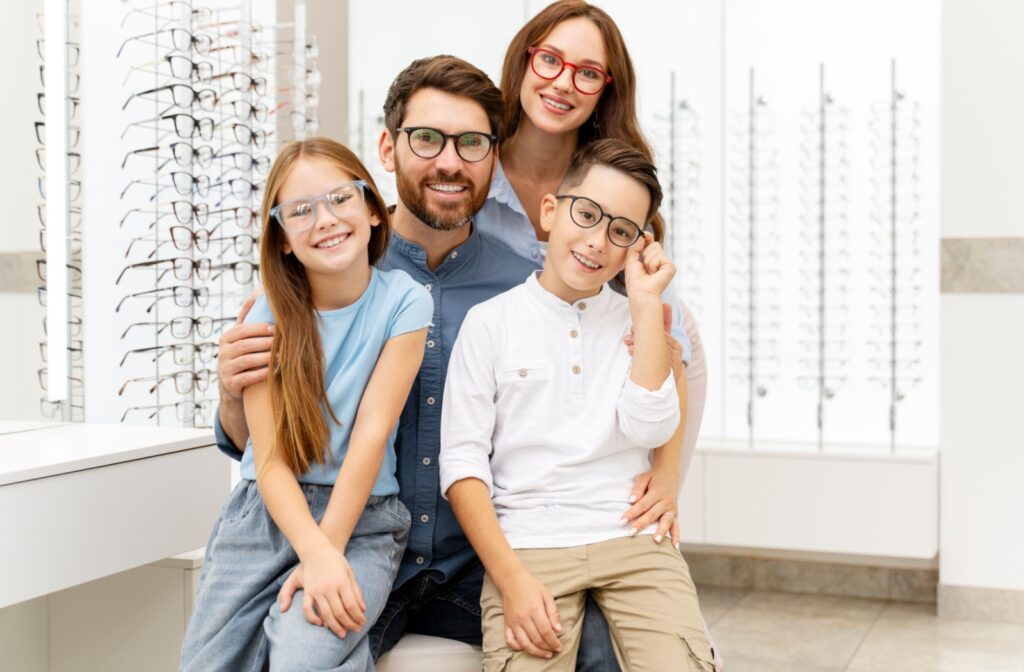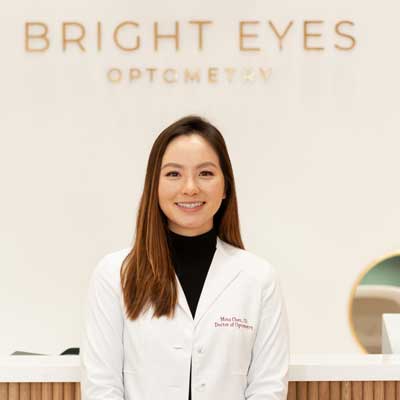Vision changes are often subtle at first. Maybe you’re squinting more often or finding it harder to focus during screen time. Over time, these small shifts can point to a bigger issue: your eyes may need some help.
Blurry vision, frequent headaches, and eye strain are some of the most common signs that you might need glasses.
Other symptoms, like squinting, struggling to see at night, or even double vision, can signal that your eyes are working harder than they should. Recognizing these signs early and scheduling a comprehensive eye exam is a wise next step.
Common Signs You May Need Glasses
Blurry Vision
Blurry vision is often the first and most obvious sign that you need glasses. This symptom can affect your ability to see objects clearly at various distances and may indicate several different refractive errors.
- Nearsightedness (myopia): Distant objects look blurry, making it hard to see things like road signs or presentations.
- Farsightedness (hyperopia): Close-up tasks like reading or using a smartphone become difficult or uncomfortable.
- Astigmatism: Vision appears distorted or blurry at all distances due to an irregularly shaped cornea.
Frequent Headaches
Headaches that occur regularly, especially after visual tasks, often signal that your eyes are working harder than they should. These headaches typically develop after reading, computer work, or other activities that require sustained focus.
Eye strain headaches usually feel like a dull ache around your forehead, temples, or behind your eyes. They may be accompanied by tension in your neck and shoulders as you unconsciously adjust your posture to see better.
If you notice headaches becoming more frequent or severe, particularly during or after visual activities, it’s time to consider an eye exam.
Eye Strain & Fatigue
Eye strain occurs when your visual system works overtime to maintain clear focus. This is particularly common during extended periods of screen time, reading, or detailed work.
Symptoms of eye strain include:
- Tired, aching eyes
- Burning or itching sensations
- Watery or dry eyes
- Difficulty concentrating
- Increased light sensitivity
Digital eye strain has become increasingly common as more people spend hours looking at computers, tablets, and smartphones.
Squinting to See Clearly
Squinting is your body’s natural attempt to improve focus by reducing the amount of light entering your eyes and creating a makeshift aperture. While this may temporarily sharpen your vision, it’s not a sustainable solution.
Frequent squinting can lead to additional problems, including:
- Increased eye strain
- Headaches
- Facial muscle tension
- Wrinkles around the eyes
If you find yourself squinting regularly to read signs, watch television, or perform other visual tasks, you likely need glasses to correct your vision.
Difficulty Seeing at Night
Night vision problems can be particularly concerning, especially for driving safety. If you notice increased difficulty seeing in low-light conditions or halos around lights, or if you have trouble distinguishing objects in dim environments, you may need vision correction.
Night vision issues can result from:
- Refractive errors that become more pronounced in low light
- Early signs of cataracts
- Inadequate tear production
- Age-related changes in the eye
Special lens coatings and designs can help improve night vision and reduce glare from headlights and streetlights.
Double Vision
Double vision, or diplopia, occurs when you see two images of the same object. This can happen in one eye (monocular diplopia) or both eyes (binocular diplopia).
Causes of double vision include:
- Muscle imbalances between the eyes
- Refractive errors
- Dry eyes
- Neurological conditions
While double vision can sometimes be corrected with glasses, it’s important to have this symptom evaluated promptly, as it may indicate a more serious underlying condition.

What Happens During an Eye Exam?
A comprehensive eye exam might include several tests to evaluate your vision and eye health:
- Visual acuity testing: This measures how clearly you can see at various distances using an eye chart.
- Refraction testing: This determines your prescription for glasses or contact lenses by testing how your eyes focus light.
- Eye health evaluation: We will examine the structures of your eyes, including the retina, optic nerve, and blood vessels, to check for signs of disease.
- Intraocular pressure measurement: This screening helps detect glaucoma, a serious eye condition that can cause vision loss if left untreated.
When to Schedule an Eye Exam?
Don’t wait until vision problems become severe. Schedule an eye exam if you experience any of these symptoms:
- Blurry vision at any distance
- Frequent headaches, especially after visual tasks
- Eye strain or fatigue
- Squinting to see clearly
- Sudden changes in vision
- Flashes of light or floating spots
Early detection and treatment of vision problems can prevent them from worsening and help you maintain clear, comfortable vision throughout your life.
Take the Next Step Towards Better Health
If you’re noticing signs that you might need glasses, don’t wait—vision problems often worsen without correction. At Bright Eyes Optometry in Petaluma, we offer comprehensive eye care to help you see clearly and comfortably. From routine exams to specialty services like dry eye treatment and myopia management, our team is here to support your vision needs. Book your appointment online today and start your journey to better eye health.



